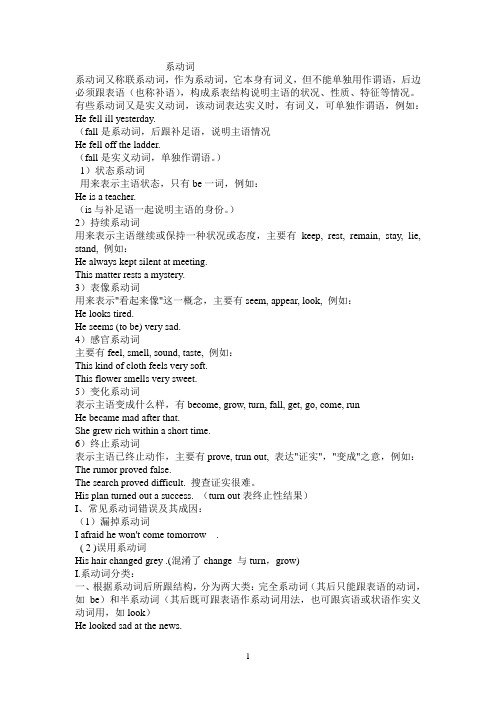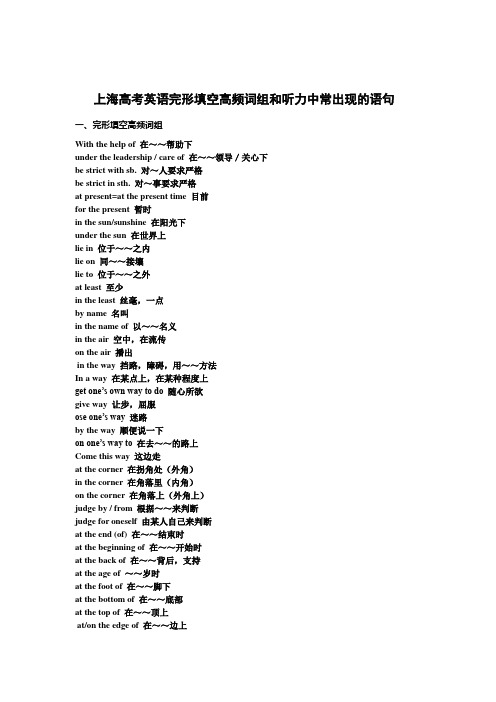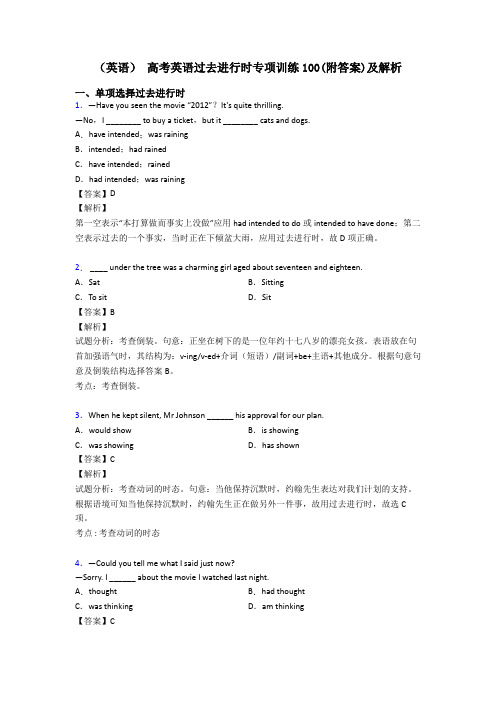由高考题看lie的用法
高考英语系动词

系动词系动词又称联系动词,作为系动词,它本身有词义,但不能单独用作谓语,后边必须跟表语(也称补语),构成系表结构说明主语的状况、性质、特征等情况。
有些系动词又是实义动词,该动词表达实义时,有词义,可单独作谓语,例如:He fell ill yesterday.(fall是系动词,后跟补足语,说明主语情况He fell off the ladder.(fall是实义动词,单独作谓语。
)1)状态系动词用来表示主语状态,只有be一词,例如:He is a teacher.(is与补足语一起说明主语的身份。
)2)持续系动词用来表示主语继续或保持一种状况或态度,主要有keep, rest, remain, stay, lie, stand, 例如:He always kept silent at meeting.This matter rests a mystery.3)表像系动词用来表示"看起来像"这一概念,主要有seem, appear, look, 例如:He looks tired.He seems (to be) very sad.4)感官系动词主要有feel, smell, sound, taste, 例如:This kind of cloth feels very soft.This flower smells very sweet.5)变化系动词表示主语变成什么样,有become, grow, turn, fall, get, go, come, runHe became mad after that.She grew rich within a short time.6)终止系动词表示主语已终止动作,主要有prove, trun out, 表达"证实","变成"之意,例如:The rumor proved false.The search proved difficult. 搜查证实很难。
(英语)高考英语过去进行时技巧小结及练习题

(英语)高考英语过去进行时技巧小结及练习题一、单项选择过去进行时1.Linda felt someone ________ on her way home from work yesterday evening, and therefore she was frightened and looked back from time to time.A.followed B.would followC.had followed D.was following【答案】D【解析】D 考察动词时态。
句意:琳达昨天晚上在下班的路上感觉打一直有人跟着她,因此她十分害怕,不时回头去看。
根据语境可知此处强调过去某一时间一直在发生的事情,使用过去进行时。
故D正确。
2.––Have you asked Peter for advice?––No, he ______ someone, so I didn’t disturb him.A.is talking with B.has talked withC.was talking with D.had talked with【答案】C【解析】试题分析:句意:—你问彼得的意见了吗?—没有,他当时在和人说话,所以我没去打扰他。
过去某个时间正在做某事应该用过去进行时,故选C。
考点:考查动词时态的用法。
3.When he kept silent, Mr Johnson ______ his approval for our plan.A.would show B.is showingC.was showing D.has shown【答案】C【解析】试题分析:考查动词的时态。
句意:当他保持沉默时,约翰先生表达对我们计划的支持。
根据语境可知当他保持沉默时,约翰先生正在做另外一件事,故用过去进行时,故选C 项。
考点 : 考查动词的时态4.—Could you tell me what I said just now?—Sorry. I ______ about the movie I watched last night.A.thought B.had thoughtC.was thinking D.am thinking【答案】C【解析】试题分析:考查动词的时态;句意:你能告诉我你刚才说的是什么吗?对不起,我正在想我昨晚所看的电影;根据句意可知当时正在做什么,故选C项。
高考表语从句的主要用法

1. The reason ____ we don’t trust his is ____ he often lies. 2. ____ he often lies is the reason ____ we don’t trust him. 3. --____ don’t you trust him? --It is ____ he often lies.
正儿八经练习一把
1. That’s ___ the Party called on us to do. A. why B. what C. how D. that
2. The reason is ___ he is unable to operate the machine.
A. because B. why C. that D. Whether
missed the early bus.
例题2: B The reason why he failed is ________he was too careless. A. because B. that C. for D. because of
注意点2:
主句主语为reason, 只能用that引导表语从句, 不可用because.
The question is how the past is made to serve the present and foreign things are made to serve China.
那时我在管伙食。
That was when I was in charge of mess.
根本问题就在这里。
填 空 : The reason why we didn't trust that him is ______ he has often lied.
上海高考英语完形填空高频词组和听力中常出现的语句

上海高考英语完形填空高频词组和听力中常出现的语句一、完形填空高频词组With the help of 在~~帮助下under the leadership / care of 在~~领导/关心下be strict with sb. 对~人要求严格be strict in sth. 对~事要求严格at present=at the present time 目前for the present 暂时in the sun/sunshine 在阳光下under the sun 在世界上lie in 位于~~之内lie on 同~~接壤lie to 位于~~之外at least 至少in the least 丝毫,一点by name 名叫in the name of 以~~名义in the air 空中,在流传on the air 播出in the way 挡路,障碍,用~~方法In a way 在某点上,在某种程度上get one’s own way to do 随心所欲give way 让步,屈服ose one’s way 迷路by the way 顺便说一下on one’s way to在去~~的路上Come this way 这边走at the corner 在拐角处(外角)in the corner 在角落里(内角)on the corner 在角落上(外角上)judge by / from 根据~~来判断judge for oneself 由某人自己来判断at the end (of) 在~~结束时at the beginning of 在~~开始时at the back of 在~~背后,支持at the age of ~~岁时at the foot of 在~~脚下at the bottom of 在~~底部at the top of 在~~顶上at/on the edge of 在~~边上in the course of 在~~过程中in the eyes of 从~~观点看来,在~~眼里in the face of 面对~,尽管,纵使in the middle of 在~中间in the end =at last=finally 最后on the eve of 在~~前夕on the side of 在~~一边after a time = after some time 过一段时间后for a time = for some time 一时,有一段时间behind time 迟到,过期behind the times 落在时代后面at no time 决不in no time 立即,马上at one time = once time 曾经at a time = each time 每次at times = sometimes 有时at all times 经常,一直,始终at the same time 同时at the time 在~~的时候by the time 到~~的时候for a moment 一会儿for the moment 暂时at the moment 当时the moment /minute /instance 正当~~一刹那once or twice 一两次more than once 不止一次once more 重新,又once upon a time 从前once in a while 偶尔1. 以break为中心的词组break away from 脱离,逃离break down 破坏,粉碎;瓦解;出故障,抛锚break in 闯进,打断;使顺服break into 闯入;强行进入;突然开始break out 爆发,发生;准备使用;起锚break the law 违反法律break the record 破记录break one’s promise 失言break up 开垦,破碎;解散,分开,分解2. 以catch为中心的词组be caught doing 被发现做某事be caught in the rain 淋雨catch a bus/train 赶汽车/火车 catch a cold 伤风,感冒catch one’s word 听懂某人的话catch sight of 发现,瞥见catch up with 赶上,追及,追上3. 以come为中心的词组come across 偶尔发现,想起;越过;偿付come along 一道来,陪伴;进步,进展;出现come at 达到,求得,得到;扑向,袭击come back 回来;恢复,复原come down 倒下;降落;跌落;病倒come from 来自,起源于,从~~产生,生于come in 进来,进入;流行起来;获名次come into being 发生,产生,出现,形成come into power 开始执政,当权,当选come into use 开始使用,获得应用come on 上演;开始;赶快;发展;登台;(问题)被提出come to know 开始了解到come out 出来,传出;出版;结果是;褪色;(秘密)泄露come to 苏醒,复原;共计;达到;归结于come to an end 终止,结束come true 实现,成为现实;证实come up 走近;上楼;长出,发芽4. 以do为中心的词组be done in 精疲力竭be done with 完全结束do a good deed 做一件好事do away with 去掉,废除;弄死;浪费do good to (=do sb. good) 有益于do harm to (=do sb. good) 有害于do its work 有效,有作用do much 极有用do wrong to 做错do one’s best 尽某人最大努力do one’s homework 做作业do one’s utmost 尽力而为do proud 足以使~~骄傲do sb. justice 公平对待某人do some cleaning (V+ing,etc.) 搞卫生do sb. a favor 帮助某人do well in 学得不错,干得漂亮do with 和~~相处,忍受,处理do without 不需要,不用do wonders 创造奇迹have much to do with 和~~很有关系have nothing to do with 与~~无关have something to do with 和~~有关in doing so=in so doing 这时,在这种情况下That will do. 行了;够了5. 以get为中心的词组get about 徘徊,走动,旅行;流传get above oneself 自视高傲get accustomed to 习惯于,对~~习以为常get across 度过,通过,横过;说服,使理解get ahead of 胜过,超过get along 前进,进步;同意;离去get along with 与~~相处get at 发现,了解;掌握;攻击have got to do 不得不,必须get away 离开,逃脱get back 取回,回来;报复get behind 落后;识破get down 咽下;写下;使沮丧,使抑郁get down to 认真对待,静下心来get familiar with 熟悉get hold of 获得,取得get home 到家get in 进入,陷入;牵涉get off 送走;脱下(衣服);下车;动身get on 上车;穿上;进步,使前进;成功;相处get upon with 进步;在~~方面获得成功get one’s hand in 熟悉;习惯get out of 由~~出来,从~~得出;避免;退休get over 越过;恢复,痊愈;克服;完成get ready for 为~~作准备get rid of 除去,去掉;免除,摆脱get through 到达,完成,通过;及格get together 积聚,积累;商谈,取得一致意见get up 起床,起立;研究,钻研;致力于;安排,组织get used to 习惯于6. 以give为中心的词组be given to 沉溺于,癖好give about 分配;传播give and take 相互迁就give away 赠送;牺牲;泄露;颁发give back 归还give cause 给予~~的理由give ear to 侧耳倾听give forth 发出,放出;发表give in 屈服,让步,投降give in to 同意,接受;向~~让步give off 发出(烟,气味) give oneself out to be/as 自称为give oneself up to 专心于;向~~自首give out 分发,公布give place to 让位于,被~~所替代give rise to 引起,导致;使~~发生give sb. to understand 通知某人give up 放弃;停止give way to 让步,退却;屈服于7. 以look为中心的词组look about 四下环顾;查看look after 照顾,看管look around 东张西望look at 注视,着眼于look back 回顾look for 寻找;期待,期望look down on 俯视;轻视look forward to 盼望,期待look into 窥视;调查;浏览look like 看起来象look on 旁观;面向look out 向外看;注意;当心,堤防look over 从上面看过去;检查look through 透过~~看去;看穿;浏览look up to 仰望,尊敬8. 以make为中心的词组be made from 由~~原料制成be made of 由~~材料制成be made up of 由~~组成make a fool of 愚弄,欺骗make a mistake 弄错make a point of doing 强调;认为~~重要;决心,坚持make advantages/use of 使用,利用make after 追求,追赶make believe 假装make certain 确信,把~~弄清楚make contact with 接通,与~~接触,与~~联系make for 去向,向~~前进;有利于make friends with 和~~交友make into 把~~制成,使~~转变为make much of 重视;理解;赏识make one’s mind on sth. 决定某事make one’s own 当作自己的看待make oneself at home 随便,别拘束make out 填写;开支票;理解;辨认make the best of 尽量利用;极为重视make up 弥补,修理;赔偿,补偿;起草;编造;化装make up to 接近,巴结;向~~求爱make way for 为~~让路,让路于on the make 急求成功;增加9. 以put为中心的词组put aside 把~~放在一边;搁置;排除put away 把~~放好,把~~收拾;储藏;吃喝,吃掉put back 把~~放回原处;驳回put down 放下;镇压;制止;记下;削减;降落put forward 提出;拨快;建议,推荐;提倡,倡议put ~~ into 把~~放入;插入;翻译成put off 推迟,延期;消除;推脱,推辞put on 上演;穿上,带上put up with 忍受,容忍put one’s heart into 全神贯注,专心致志put up 举起,挂起;提名,推荐;陈列10. 以take为中心的词组be taken aback 吃惊take a seat 就坐take a shower 淋浴,洗澡take aim 瞄准,设立目标take away 拿走,减去;夺去take ~~ by surprise 出奇制胜take one’s place 就坐,入坐take care of 当心,注意;照顾;提防;谨慎;处理,对付;负责take office 就职,上任take ~~ for 把~当作take off 脱去,除去;离开;起飞;模仿;起程;致死;复制,作副本;减弱take one’s temperature 量体温take part in 参与,参加take it easy 别着急,慢慢来take place = happen 发生,举行take the place of 代替take pride in 以~~为荣,对~~骄傲take sb. by the arm 拉某人的胳膊11. 以turn为中心的词组give a new turn to 对~~予以新的看法in one’s turn 轮到某人做某事out of turn 不按次序的,不合适宜的take one’s turn to do 轮到做turn a blind eye to 对~~视而不见turn against 背叛,采取敌对态度turn back 折回,往回走turn down 折叠,翻下,驳回,拒绝考虑turn into 走进;变成,变为turn to ~~for help 求助于turn off 关上(自来水,电器开关);解雇,辞退;避开(问题);制造;生产turn on 打开(自来水,电器开关);反对;依靠,依赖,取决于turn one’s attention to 把注意力转向turn out 培养;证明是;制成;实际情况是turn out to be 原来是,证明是,结果是turn over a new leaf 翻开新的一页,重新开始,改过自新turn (a)round 旋转,转过身来;改变意见;采取新政策turn to 变成;着手于turn upside down 颠倒过来,翻过来;使陷入混乱1.be on show / display / play / sale / strike / duty / trial2. be of value / importance / use / no use / color / age / size / height / weight / significance3. to one’s joy / surprise / pleasure / astonishment / sorrow / delight4. in surprise / wonder / alarm / terror / horror / delight5. by air / bicycle / boat / bus / car / letter / post / plane / telephone / train / wire6. at daybreak / sunrise / dawn / noon/ dark / night7. out of breath / control / question / sight8. in fact / reality / substance / nature / practice / theory / short / brief / a word / detail / all / average / full / time / fashion / existence / turn / vain / haste / appearance / common / sum/ general / particular / public / secret / order / part / power / stock / case / bed / future / name / addition / sight9. on duty / shift / holiday / leave / business / purpose / time / sale / show / board / hand / record / request / root / earth / farm / principle10. for example / instance / all / good / nothing / convenience / short / fear / sale11. by weight ( volume size number~~ ) / profession / definition / rule / turn / chance/ accident/ mistake / hand / train ( bus ,taxi ,ship ,boat ~~) / air / land / force / day / nature / sight12. at most / least / best / worst / once / first / last / home / school / will ( at will:任意) / work / night / midnight / daybreak / dawn / present / length / large13. as above / below / following / over / usual / before / a matter of fact14. above all / measure / normal15. before all / long / time / now / then16. after all / class / school17. out of action / order / condition / use / operation / step / joint / repair/ gear / balance / range/doubt / date / danger / hand / shape / place / question / stock /18. with caution / interest / difficulty / ease / advantage / effect / reason / vigor / reserve / success / confidence19. beyond comprehension / conception / description / expression / doubt / control / reach / power / measure / grasp / compare / controversy / dispute / hope / example20. under age / discussion / test / way / repair二、听力中常出现的语句1) take a rain check 延期2) lost count 弄不清楚3) be in another world 精神恍惚;魂不守舍4) make yourself at home 随意,随便5) save your breath 省口气吧;别白费口舌了6) make sense 有意义,理解7) cost sb. an arm and a leg 非常昂贵8) burn a hole in one's pocket 很快地被花光9)fill one's shoes 很好地顶替;令人满意地替代10)is ice cold 表示理所当然11)like apples and oranges 用来表示无法相比的事物12)wait until the last minute 直到最后一刻13)lose one's train of 忘记14)meet each other half way 相互妥协,让步15)on the dot 准时;正点16)once and for all 最后一次;干脆17)out of earshot 不在听力所及范围18)out of this world 非常好19)play by ear 随机应变,视情形而定20) ring a bell 令人想起某件事;听起来耳熟21)share a common outlook 有共同的观点22)six of one and half-a-dozen of the other 半斤八两;没什么区别23)stick around 在附近逗留或等待24)stick with 继续做,坚持25)straighten out 扯平;结清26)toss and turn (身体)翻来覆去(通常表示难以入睡)27)turn one's back (在别人遇到困难时)不愿帮助28)under the weather 身体不适,生病29)bite off more than one can chew 贪多嚼不烂;心有余而力不足;不自量力;力不从心30)break new ground 创新31)do the trick 做成功;达到理想的结果32)drag one's feet 行动缓慢;磨磨蹭蹭不情愿33)draw the line 拒绝,拒不容忍34)feel down in the dumps 心情不好;情绪低落35)few and far between 不多;少而分散的;不常碰到或发现的;稀少的36)fit as a fiddle 身体很健康37)grin and bear 任劳任怨;毫无怨言地忍受38)hit the spot (特指吃了食物,喝了饮料之后)精神完全恢复过来或感到满足;恢复精力;提精神39)keep between the two of us 不让第三者知道,保密40)know a thing or two about 略知一二。
黄冈中学2019高考英语二轮专项练习及解析:语法单项选择系列(3)

黄冈中学2019高考英语二轮专项练习及解析:语法单项选择系列(3)1、TraditionalChinesemedicineisthousandsofyearsoldandhasdeveloped_______timE、A、overB、inC、onD、of【答案】A【解析】考查固定词组。
Overtime随着时间地过去;句意:传统的中医差不多有了成千上万年了。
且:随着时间的过去也一直在进展。
2、_______withtheJapanesegovernment,someChinesepeopledecidednottobuyproductsfromJa pananymorE、A、NotsatisfyingB、NothavingsatisfiedC、NotsatisfiedD、Nottosatisfy【答案】C【解析】考查形容词用法。
Notsatisfied是对句子主语someChinesepeople的情况解析解释。
句意:因为对日本政府不中意,一些中国人决定不买日货。
故C正确。
3、AfterIwentabroadforfurtherstudy,_______ofmyparentslivedwithmE、A、noneB、neitherC、eitherD、any【答案】B【解析】考查代词。
因为我的父母只有2人,因此用neither表示两者都不。
句意:我出国深造以后,我的父母都不和我一起住了。
故B正确。
4、WhenHelensawhertutornod_______toher,shecalmeddownandwentonwithherperformancE、A、encouraginglyB、amazinglyC、interestinglyD、willingly【答案】A【解析】副词辨析。
A鼓舞人地。
鼓励人地;B让人惊讶地;C有味地;D情愿地;句意:当Helen看见她的老师鼓舞地向她点头的时候,她镇定地接着她的表演。
人大附中高中英语新高考语法一轮复习讲义(19)易用错动词lie lay rise raise arise sit set seat知识总结

2021届人大附中高中英语新高考语法一轮复习讲义(19)易用错动词(lie,lay、rise,raise,arise、sit,set,seat)知识点总结整理英语语法第22期——(上)在学英语的过程中,有些近义词或形近词如等,特别容易混淆,初学英语的同学总是分不清楚,不知道该怎么翻译,也常用错,所以我特意整理了一些容易用错的词,欢迎大家留言讨论——lie与laylie(躺,说谎)与lay(放置)易混淆动词过去式过去分词现在分词lie:躺(vi) lay lain lyinglie:说谎(vi) lied lied lyinglay:放置(vt) laid laid layinglie为不及物动词,常翻译为“躺”和“说谎”,且他们动词变化不完全相同,大家千万记住。
lie译为“躺”例句:动词原型:Ge You will lie on the sofa for a while(葛优将在床上休躺片刻)过去式:Ge You came in and lay on the sofa (葛优走进来躺在了沙发上)过去分词:Ge You has lain on the sofa for eight hours (葛优在床上躺了八个钟头了)现在分词:Ge is lying on the sofa all day(葛优整天躺在沙发上)以上是不及物动词lie作为“躺”的用法。
lie作为“说谎”也是不及物动词,用法基本一样,不再赘述。
lay(vt.放置,产卵),例句:He will lay a book one the desk(他会把一本书放在桌上)He laid a book on the desk(他放了一本书在桌上)需要注意的是lie(躺)的过去式lay与及物动词lay(放置,产卵)在形态上是一样的,区分的方法是看lay后面是否有宾语,因为只有及物动词后面才跟宾语。
如果实在记不住看看下面的助记口诀:lei与lay动词变化助记口诀规则的撒谎lie撒谎过去式过去分词规则变化不规则的躺lie躺过去式过去分词不规则变化躺过就下蛋躺的过去式是下蛋的原形下蛋不规则下蛋的过去式过去分词不规则变化——sit、set和seat易混淆动词过去式过去分词现在分词sit:坐(vi.) sat sat sittingset:安置(vt.) set set settingseat:使就坐(vt.) seated seated seatingsit为不及物动词,后面无需加宾语,seat为及物动词,需加宾语例1:He came in and sat down(他走进来并坐了下来)在口语中请就坐可以使用祈使句:sit down ,please或者please have a seat。
【高考英语一轮复习】第四讲 特殊句式

第四讲 特殊句式特殊句式近五年仅仅考查过祈使句。
但特殊句式为构建复杂句式、分析长句提供了坚实保障。
备考把握以下内容:1.特殊句式包括:①强调句 ②倒装句 ③省略句 ④祈使句 ⑤感叹句 ⑥附加疑问句2.高考考查热点:①强调句中的it 和that ②特殊句式中的there be ③一些常用的固定表达结构一、完全倒装完全倒装是指将句子中的谓语动词全部置于主语之前。
此结构通常只用于一般现在时或一般过去时。
二、部分倒装部分倒装是指将谓语的一部分,如助动词或情态动词,置于主语之前。
如果句中的谓语部分不含有助动词或情态动词时,则需添加助动词do, does或did,并将其置于主语之前。
将下列句子变为倒装句①She didn’t have supper until her mother returned.→Not until her mother returned did__she__have__supper.②I hardly think it possible to finish the job before dark.→Hardly do__I__think__it__possible__to__finish__the__job__before__dark.③He learned the sad news only after the war.→Only after the war did__he__learn__the__sad__news.④He speaks English so clearly that he can always make himself understood.→So clearly does__he__speak__English__that__he__can__always__make__himself__understood.强调句型的基本结构单句语法填空/补全句子①It was when I got back to my apartment that I first came across my new neighbors.(天津卷单选改编)②It was only when the car pulled up in front of our house that__we saw Lily in thepassenger seat.(2018·天津卷单选改编)③It__was__not__until__midnight__that the noise of the street stopped.直到午夜,街上的嘈杂声才停止。
(英语) 高考英语过去进行时专项训练100(附答案)及解析

【解析】
试题分析:考查动词的时态;句意:你能告诉我你刚才说的是什么吗?对不起,我正在想我昨晚所看的电影;根据句意可知当时正在做什么,故选C项。
5.Yesterday, my father was so lost in his thoughts that he didn’t realize he ____ the red lights.
试题分析:考查时态:句意:--大卫,你在听吗?--对不起,爸爸,我在想理解记者说的话。说明大卫刚刚正在想理解记者说的话,用过去进行时。选A。
考点:考查时态
点评:时态题的考查关键是抓住句子的上下文含义和句中的时间状语。要根据时间状语来选择合适的时态,在平时的学习中要注意积累有关时态的用法和各种时态的特殊之处。
13.—What happened to Bill?
—He ________ really fast when suddenly he ran into a parked car.
A.had runB.was running
C.has runD.has been running
【答案】B
【解析】
B考察动词时态。句意:—Bill怎么啦?—他跑得很快,突然撞到了一辆停着的车子上。根据when suddenly he ran into a parked car可知他奔跑是在过去一段时间里发生的动作,所以使用过去进行时。故B正确。
A.ranB.was runningC.runsD.has run
【答案】B
【解析】
试题分析:考查时态的运用。句意:昨晚,我的父亲太过沉浸在思考中以致于他没有意识到自己正在闯红灯。根据句意可知,主语的动作是在过去的某一时刻正在发生,应该选用过去进行时,故选B。
- 1、下载文档前请自行甄别文档内容的完整性,平台不提供额外的编辑、内容补充、找答案等附加服务。
- 2、"仅部分预览"的文档,不可在线预览部分如存在完整性等问题,可反馈申请退款(可完整预览的文档不适用该条件!)。
- 3、如文档侵犯您的权益,请联系客服反馈,我们会尽快为您处理(人工客服工作时间:9:00-18:30)。
【典型考例】
At the foot of the mountain 〓〓〓. (2006 四川)
A. a village lie
B. lies a village
C. does a village lie
D. lying a village
解析:B。
句意为“山脚下有一座村庄。
”将介词短语放在句首时常使用全部倒装语序,即将整个谓语动词放在主语的前面,由此先排除选项D;选项A的语序没有倒装且谓语动词lie的数没有与主语“a village”的数保持一致;选项C为部分倒装语序,不符合“将介词短语提前放在句首应使用全部倒装语序”的语法规则,故不对;选项B将整个谓语动词lies 放在主语之前,符合语法规则,故选B。
【常见错误】
误①:Japan lies to the east of Asia.
误②:Across the stream does a narrow bridge lie.
误③:The boy often says lies.
误④:He lay the book on the desk.
【主要用法】
1. lie表示人或物“躺;卧;放”等意,为不及物动词,后面常接表示地点的副词或介词短语作状语,也可作系动词,后接分词或表示状态的形容词作表语。
如:
She lay on the grass. 她躺在草坪上。
The book lay open on the desk. 那本书摊开着摆在桌子上。
Fallen leaves lie rotting on the ground. 落叶在地上腐烂着。
2. lie 表示事物的位置,意思是“位于”,为不及物动词,后接表示地点的副词或介词短语。
表示在某个范围之外,与to连用;表示在某个范围之内,与in连用;表示相邻的地方,与on连用;指某个岛屿位于某沿岸时,则与off连用。
如:
Japan lies in the east of Asia. 日本位于亚洲的东部。
(日本在亚洲的范围之内)(参见“误①”)Japan lies to the east of China. 日本位于中国的东面。
(日本在中国的范围之外)
3. lie表示某事“在于……”,后接表示地点的副词,接名词时须与in连用。
如:
The trouble lies in the engine. 问题出在引擎上。
The danger lies there. 那正是危险所在。
4. 有时为了加强语气,可将表示地点的副词或介词短语提前放在句首,这时句子通常要使用全部倒装
语序,即将整个谓语动词放在主语的前面。
如:
A narrow bridge lies across the stream.→Across the stream lies a narrow bridge. 小溪上有一座很窄的桥。
(参见“误②”)
Many difficulties lie ahead of us.→Ahead of us lie many difficulties. 我们前面有很多困难。
5. 注意lie在上面1—4项中表示“放、躺、位于”,其过去式、过去分词及现在分词分别是lay, lain, lying。
lie表示“说谎”,可作名词及动词,其过去时、过去分词及现在分词分别是lied, lied, lying,表示“对……说谎”时,与to连用;lay为及物动词,意为“放置、产(卵)”,后接名词或代词作宾语,其过去式、过去分词及现在分词分别为laid, laid, laying。
如:
The boy often tells lies. = The boy often lies. 这男孩经常说谎。
(参见“误③”)
He lied to you just now. 他刚才对你说谎了。
He laid the book on the desk. 他把书放在桌子上。
(laid为lay的过去式)(参见“误④”)
A book lay on the desk. 桌子上放着一本书。
(lay为lie的过去式)
1 / 1
天仁集团版权所有禁止转载。
